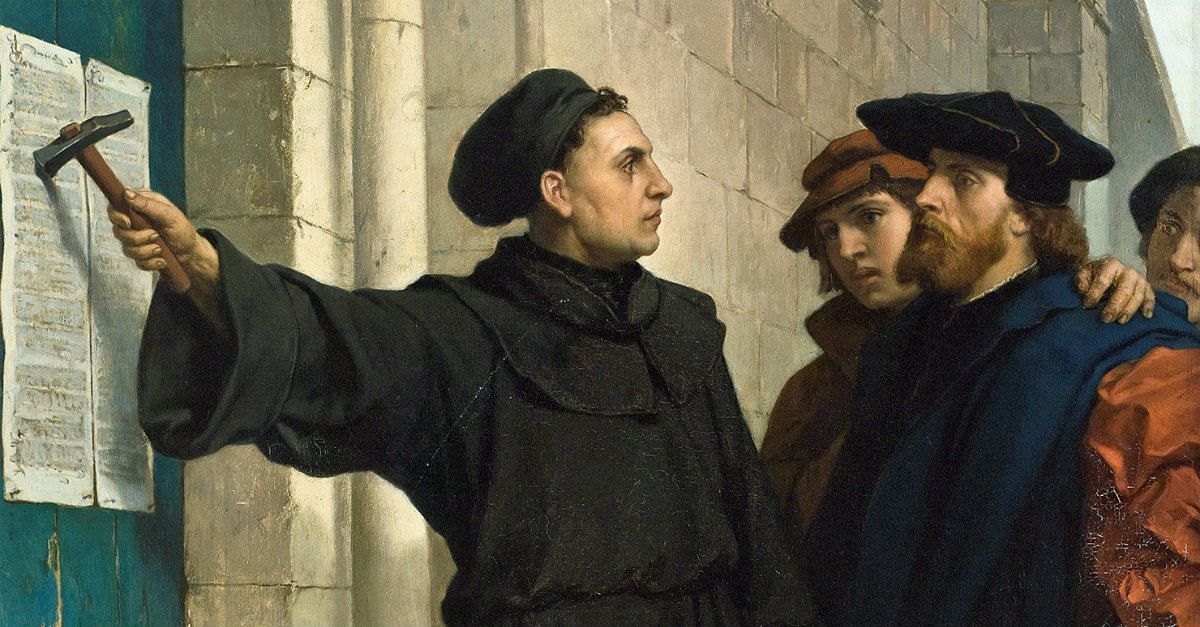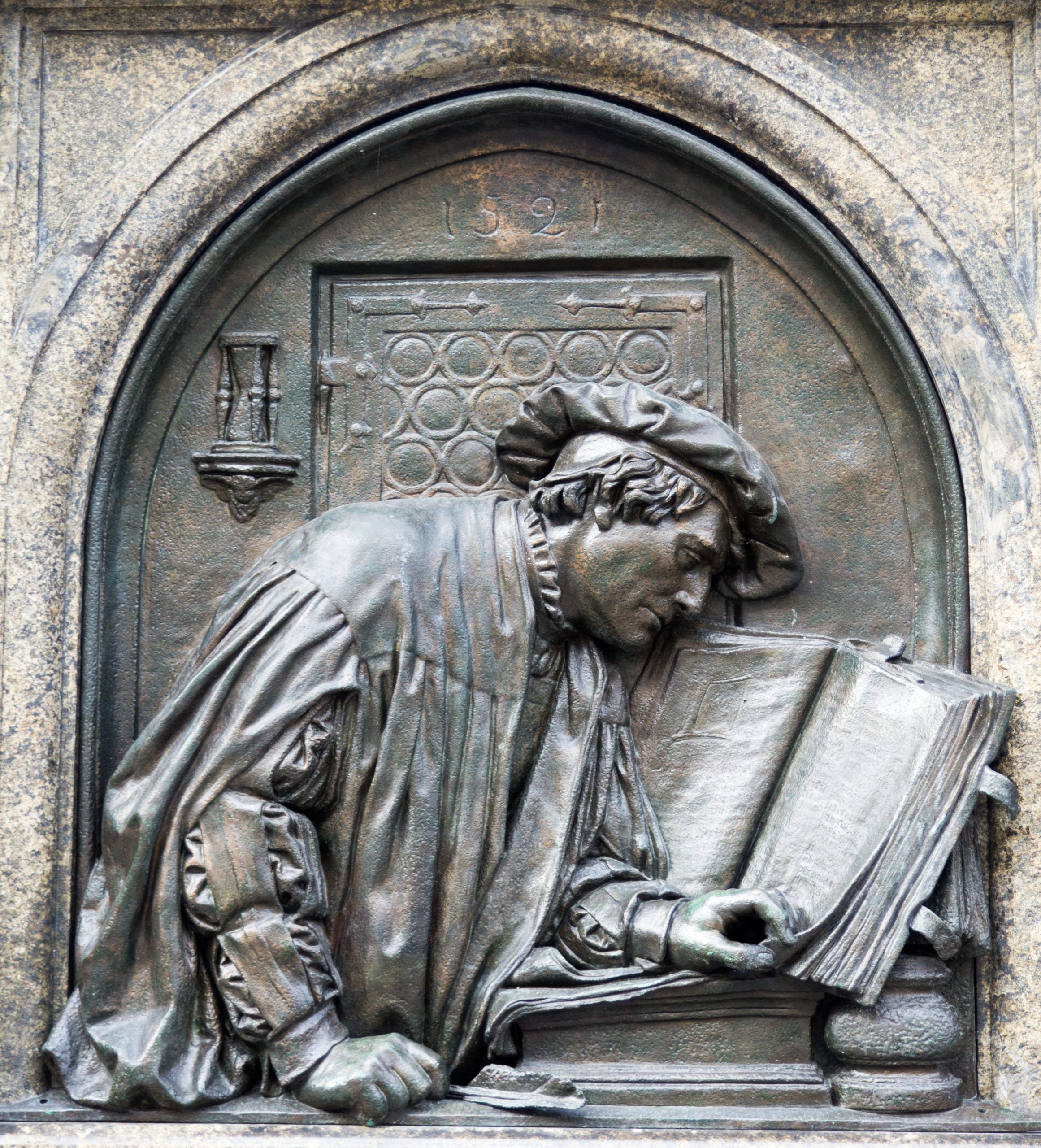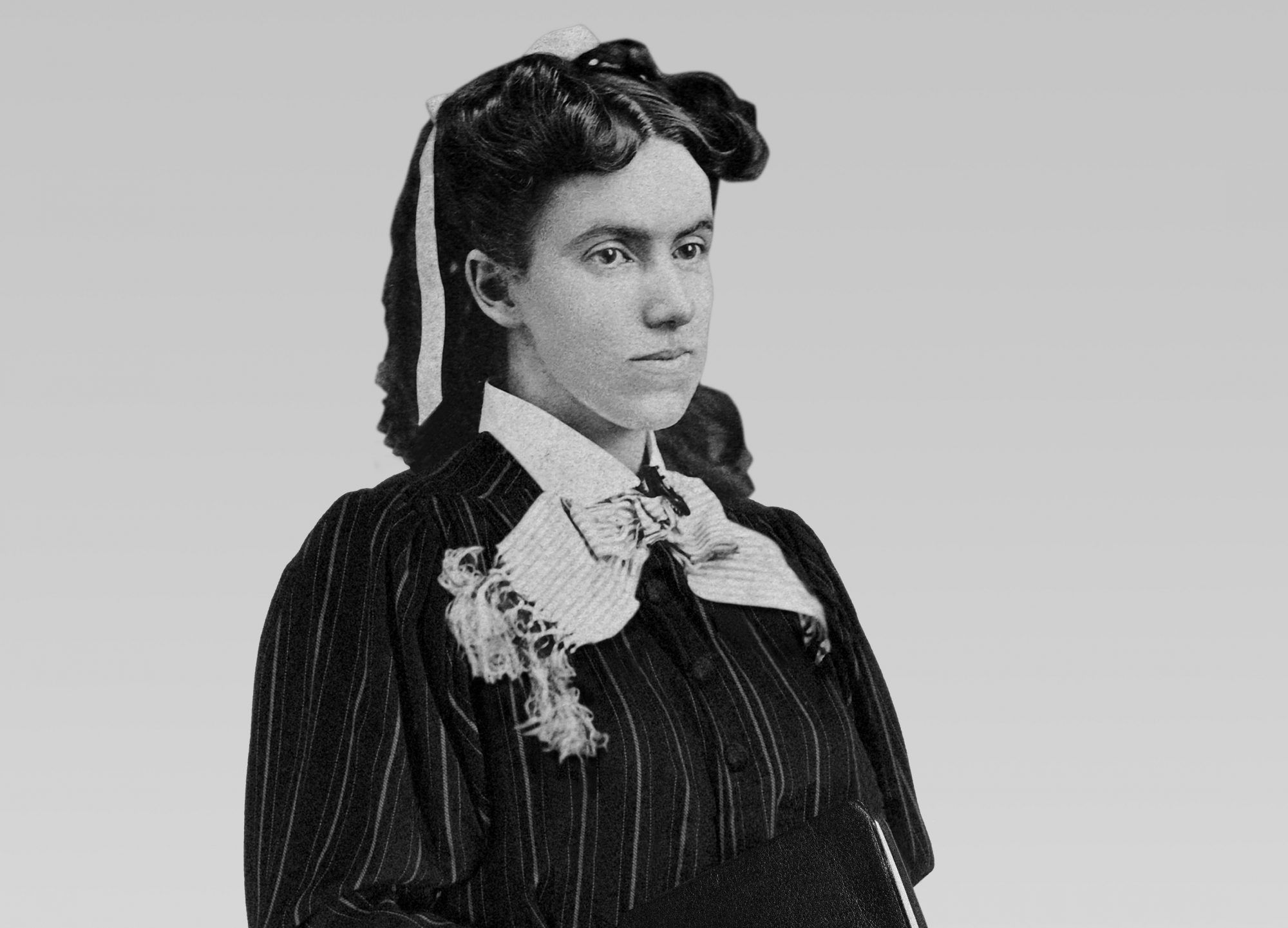The Five Solas and Why they Matter Today
** This post is a part of our ongoing focus in the month of October as we look back to the Reformation of the 1500s and why it still matters today. This blog post was written by Josh Bird.
On October 31, kids will dress up as ghouls, monsters, superheroes, and all sorts of different creatures. They will roam from house to house threatening tricks to get treats. And when all is said and done and they get back to their own homes, their dads will take the customary candy tax from them. This is how we celebrate Halloween, but while October 31 is normally devoted to witches and goblins, it is also important historically for another reason. It was on this day in 1517 that Martin Luther posted his 95 theses to the church door in Wittenburg, Germany.
That day in 1517 is often credited with beginning the Protestant Reformation. It is important to realize that there were reformers before Luther, and there were reformers after Luther, but that Halloween day in 1517 was most assuredly a landmark day. Luther’s primary complaint at that time was that the Roman Catholic Church was abusing its members through the selling of indulgences. But while that was the complaint that sparked the Reformation, it was not the primary impediment or theology that drove the Reformation. The theology of the Reformation is often summarized in what is known as the five solas: Sola Scriptura, Sola Fide, Sola Gratia, Solus Christus, and Soli Deo Gloria. The word sola is Latin for “alone.” Ironically, as we will see, no sola truly stands alone, but they build off one another to give an understanding of God’s ultimate plan of redemption and how he conveys that message to us.
Sola Scriptura
The first primary argument of the reformers was that scripture is the highest infallible rule of faith for the Christian church. As 2 Timothy 3:16 says, “All scripture is breathed out by God and profitable for teaching, for reproof, for correction, and for training in righteousness.” The reformers were ardent on this subject. In his commentary on Galatians, Martin Luther said that “a simple layman armed with scripture is greater than the mightiest pope without it.”
Protestants and Roman Catholics believed and still believe that scripture is infallible, inerrant, and inspired by God. The difference between the two sides is that Protestants believe that scripture is the only infallible rule of faith. Roman Catholics believe that there is also an infallible oral tradition. They also believe that an authorized official is necessary to interpret both oral tradition and scripture to ensure their proper understanding and application. This is sometimes described as the three-legged stool. For the Roman Catholic oral tradition and scripture are intertwined.
The reformers were sensitive to the importance of church history and tradition. They often cited theologians and early church fathers to support what they were arguing. However, they continuously claimed that all traditions must be tested against the authority of scripture. Because at its heart, Sola Scriptura is a claim of authority. There is certainly authority outside of scripture. For example, at Grace Life Church, we are under the authority of the elders, Pastor Ben and Pastor Matt. But the only infallible rule of faith and authority for God’s church is sacred scripture.
Sola Gratia
Sola Gratia is the emphasis that we are saved by grace alone. It is a gift from God. As sinful humans, we can do nothing to earn or merit God’s grace. The Holy Spirit brings us to Christ by releasing us from our bondage to sin raising us from spiritual death to spiritual life. There is nothing that we do to warrant grace.
Scripture, which as we discussed above, is our sole infallible rule of faith, shows us how this works. Before God’s grace, we were lost in sin and slaves to our passions and pleasures. But once God shows his grace upon us, we are regenerated through the working of the Holy Spirit. Examine what Titus 3:3-7 says:
“For we ourselves were once foolish, disobedient, led astray, slaves to various passions and pleasures, passing our days in malice and envy, hated by others and hating one another. But when the goodness and loving kindness of God our Savior appeared, he saved us, not because of works done by us in righteousness, but according to his own mercy, by the washing of regeneration and renewal of the Holy Spirit, whom he poured out on us richly through Jesus Christ our Savior, so that being justified by his grace we might become hairs according to the hope of eternal life.” (ESV)
Praise be to God that we are saved by his grace. No longer do we have to attempt to earn our salvation through the law. Which is a burden we could never bear. As Charles Spurgeon once said, “If I could lose my salvation, I would.”
Sola Fide
Where Sola Gratia highlights that it is by grace alone that we are saved, Sola Fide shows us that it is through faith alone that we can accept God’s grace. Where we are saved by God’s grace alone, and through no works of our own, faith is the mechanism by which we receive God’s grace. Roman Catholics believe that God’s grace and faith are essential elements to salvation. For a Roman Catholic, you cannot be saved without God’s grace and without faith. However, the key distinction the reformers highlighted, was based on the word “alone.”
The reformers taught that we are saved by grace alone through faith alone. Roman Catholicism teaches that humans must cooperate with God’s grace. Meaning that there are works that man must do in order to remain in God’s favor. Protestants teach that we are justified by faith alone. Then, following that justification and regeneration, the Holy Spirit will produce good fruit within us. This is called sanctification. Our sanctification takes place after our justification. For the Roman Catholic, the sanctification takes place in conjunction with justification. So, from the Roman Catholic perspective, we are not saved or justified by faith alone, but by faith and works.
In response, we should look to Ephesians 2:8-10:
“For by grace you have been saved through faith. And this is not your own doing; it is the gift of God, not a result of works,so that no one may boast. For we are his workmanship, created in Christ Jesus for good works, which God prepared beforehand, that we should walk in them.” (ESV)
We see from these verses what we have been building as we work through the solas. We are looking to Scripture as the basis for God’s truth. We are saved by grace. That salvation comes through faith. This is a work of God so we have no room to boast. And then we are God’s workmanship able to perform good works after we are saved.
Solus Christus
We have looked at why we must look to scripture first for our beliefs. Then we saw that we are saved by God’s grace alone. That grace is accepted by faith alone. But faith in what? That brings us to the next sola. Our salvation is accomplished by Christ alone.
It is only through Christ, in his mediatorial role that we can be made right and have reconciliation with the Father. It is through Christ’s perfect and sinless life, that he was able to offer a sufficient sacrifice to cover our sins. In 2 Corinthians 5:21 we see that “For our sake he made him to be sin, who knew no sin, so that in him we might become the righteousness of God.” (ESV). Paul is telling us about the great exchange. Christ became sin on our behalf, so that through him we may be made righteous before God. We are saved by what the reformers called an “alien righteousness,” which is Christ’s. Christ mediates on our behalf. Paul tells Timothy in 1 Timothy 2:5 “for there is one God, and there is one mediator between God and men, the man Christ Jesus.” (ESV)
In Acts 4, Peter and John were preaching to the people when they were arrested and taken before a council. When questioned, Peter is filled with the Holy Spirit (v. 8) and tells them that Jesus, the stone rejected by the Jews, has become the cornerstone and there is salvation in no one else (v. 11-12). We can seek our salvation in no one else but Christ.
Soli Deo Gloria
Scripture is our highest authority. We are saved by Grace alone which is accepted through faith alone. That salvation is accomplished through Christ alone. But for what purpose? To the glory of God alone. This sola reminds us that all of God’s plan of redemption is for his own glory. Consider what Paul says in Ephesians 1:7-14
“In him we have redemption through his blood, the forgiveness of our trespasses, according to the riches of his grace, which he lavished upon us, in all wisdom and insight making known to us the mystery of his will, according to his purpose, which he set forth in Christ as a plan for the fullness of time, to unite all things in him, things in heaven and things on earth. In him we have obtained an inheritance, having been predestined according to the purpose of him who works all things according to the counsel of his will, so that we who were the first to hope in Christ might be to the praise of his glory. In him you also, when you heard the word of truth, the gospel of your salvation and believed in him, were sealed with the promised Holy Spirit, who is the guarantee of our inheritance until we acquire possession of it, to the praise of his glory”
Paul is making clear that we are saved through Christ according to God’s grace. And in v. 12 he tells us why, so that “we who were the first to hope in Christ might be to the praise of his glory.”
Conclusion
In conclusion, the five solas of the Reformation remain foundational principles that continue to shape the theological landscape. As theological disagreements persist, and the theological chasm between Protestants and Roman Catholics endures, it becomes all the more crucial to cling to the unshakable pillars of our faith. Scripture alone is our infallible source of authority, grace alone our saving grace, faith alone the means by which we receive that grace, and Christ alone our Savior. In it all, to the glory of God alone.




